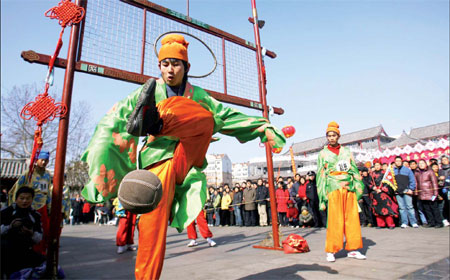
Soccer is one of the most widely watched and played games across the globe. If you review soccer statistics over the past few years, you will observe that soccer features among the highest-paying games. It is played at a professional level and for fun. Additionally, it is enjoyed by men and women of all ages. In countries other than the United States of America, soccer is better known as football.
The game is played between two teams consisting 11 players each on a rectangular field with a black and white ball. The objective is to send the ball into the opposing team's goal. Throughout the game, the ball can only be kicked; players, except the goalkeeper, cannot touch the ball with their hands. Other players are allowed to use their hands only for throw-ins. Play time is divided into 2 halves each lasting 45 minutes. There is a 15 minutes break in between. The team with the maximum number of goals is declared winner. All said and done, one often wonders about the origin of soccer. Some contend it came China while others debate it belongs to England. You can find out where soccer came from right here.
The Chinese Roots
It is stated that a game similar to football was first played in China. It was around the 2nd and 3rd century B.C. during the rule of Han Dynasty. Players dribbled leather balls and drove them into small nets. The Greeks and the Romans too played different versions of this game.
The English Ties
After the earliest evidence in China, the next activity was traced in England. Soccer became popular in England around the 12th and 13th centuries. Spectators used to throng the fields to watch the sport. Traditional soccer has a very crude form. There were no rules to regulate this sporting activity. Also, kicking, gouging, punching and biting were acceptable. The sport was banned in early-1300s because of the growing instances of violence and increasing military interference.
The sporting activity was partially revived in 1848 with the creation of "Cambridge Rules". The set of rules were created by the Cambridge University to control and standardize the game. The first Football Association was formed in 1863 in England. Countries such as Countries New Zealand, Chile, Holland, Denmark, Argentina, Belgium, Switzerland, Germany, Italy and Uruguay formed their respective football associations. It soon spread to the different parts of the world within the next 50 years. World Cup competitions, regional competitions, formation of local clubs and increasing media exposure contributed to the game's growing popularity.
In 1886, the International Football Association Board (IFAB) was established to decide the official rules of the sport. Federation International Football Association (FIFA) was set up in 1904. It adopted the IFAB laws as its manifesto. Till date, FIFA operates as the international governing body of soccer. The Union of European Football Associations (UEFA), Asian Football Confederation (AFC), Confederation of African Football (CAF), Confederation of North Central America and Caribbean Association Football (CONCACAF), South American Football Confederation (CONMEBOL) and Oceania Football Confederation (OFC) are the six regional confederations included in FIFA. The FIFA World Cup is one of the most prestigious competitions in soccer. It is played every 4 years.
insports.eu is focused to provide up-to-date soccer fixtures and football results, soccer tables, soccer statistics and live scores on soccer and basketball worldwide. Insports.eu main activity is to give to all its visitors unique statistical information with data derived from the processing of its database from more than 50 soccer and basketball leagues. You will find match Analysis, statistical tables, standings, results, fixtures, unique referee's statistics, Livescores and Livestreaming. All these soccer and basketball statistics will definitely help someone in his soccer analysis and insports.eu to be his ultimate sports tool.


0 comentarios:
Publicar un comentario